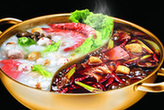Feng Xiaolian (冯小怜) was an imperial consort of the Chinese dynasty Northern Qi. She was a concubine of the penultimate Gao Wei, and his infatuation with her caused her to be, fairly or unfairly, often stated by traditional historians as a reason for Northern Qi's downfall.
Empress Hu (胡皇后, personal name unknown) was an empress of the Chinese dynasty Northern Qi. Her husband was Emperor Wucheng. She bore him two sons, Gao Wei and Gao Yan.
Empress Feng (冯皇后, 冯宁), formally Empress Wenming (文明皇后) was an empress of the Chinese/Xianbei dynasty Northern Wei. Her husband was Emperor Wencheng. After her husband's death in 465, she overthrew the autocratic regent Yifu Hun in 466 and became regent over her stepson Emperor Xianwen and remained as such until his adulthood. While Emperor Xiaowen assumed imperial powers upon adulthood, he remained very deferential to her, and she was highly influential until her death in 490.
Empress Feng Run (冯润), formally Empress You (幽皇后) was an empress of the Chinese/Xianbei dynasty Northern Wei. When she was 13, she has been selected to be Emperor Xiaowen's concubines.
Empress Dowager Hu (胡太后, personal name unknown), formally Empress Ling (灵皇后), was an empress dowager of the Chinese dynasty Northern Wei. She was a concubine of Emperor Xuanwu, and she became regent and empress dowager after her son Emperor Xiaoming became emperor after Emperor Xuanwu's death in 515. She was considered to be intelligent but overly lenient.
Empress Yang Lihua (杨丽华) was an empress of the Chinese/Xianbei dynasty Northern Zhou, and later a princess of Sui Dynasty. Her husband was Emperor Xuan of Northern Zhou (Yuwen Yun), and her father was Emperor Wen of Sui (Yang Jian).
Fan Ji(樊姬) was a consort of King Zhuang of Chu. Fan Ji helped the King Zhuang of Chu to consolidate his kingdom and advised the king to use wise and competent officials and remove the incompetent ones. There are many poems in her honor, and a memorial to her at her supposed grave in Hubei province where she used to lived.
Empress Yan Ji (阎姬), formally Empress Ansi (安思皇后), was an empress during Han Dynasty. Her husband was Emperor An. She was known for her conspiratorial and nepotistic behavior, both as empress and as empress dowager.
Empress Yin Lihua (阴丽华), formally Empress Guanglie(光烈皇后) was an empress during Han Dynasty. She was the second empress of her husband Emperor Guangwu, and she was famed for her beauty and meekness. Her posthumous name started a trend for the rest of Eastern Han Dynasty, where empresses' posthumous names were formed not just their husbands' posthumous names but used part of their husbands' posthumous names along with an additional descriptive character.
Empress Deng Sui (邓绥), formally Empress Hexi(和熹皇后) was an empress during Eastern Han Dynasty. She was Emperor He's second wife. She later, as empress dowager, served as regent for his son Emperor Shang and nephew Emperor An, and was regarded as an able and diligent administrator. She was perhaps the last effective ruler of the Eastern Han Dynasty, as the subsequent emperors and empresses dowager were largely incompetent rulers. During her regency, there were natural disasters and wars with Xiongnu and Qiang, but she was able to remedy the disasters and largely quell the wars. She was also praised for her attention to criminal justice.
Empress Ma (马皇后, personal name unknown), formally Empress Mingde (明德皇后), was an empress during Han Dynasty from the year 60 until her death. Her husband was Emperor Ming. As empress, Empress Ma was described as humble and solemn, and she loved reading. She often wore the less expensive white silk without elaborate designs. The imperial consorts and princesses were all surprised by how thrift she was and yet impressed by her. Emperor Ming often consulted her on important matters of state when he could not make a decision quickly. She would analyze the issues carefully and come up with good suggestions. One thing she was described of having never done was to request favors for her brothers and cousins. Because of this, Emperor Ming continued to respect her and love her.





Why not rent a boyfriend, or girlfriend to please parents during the Spring Festival?